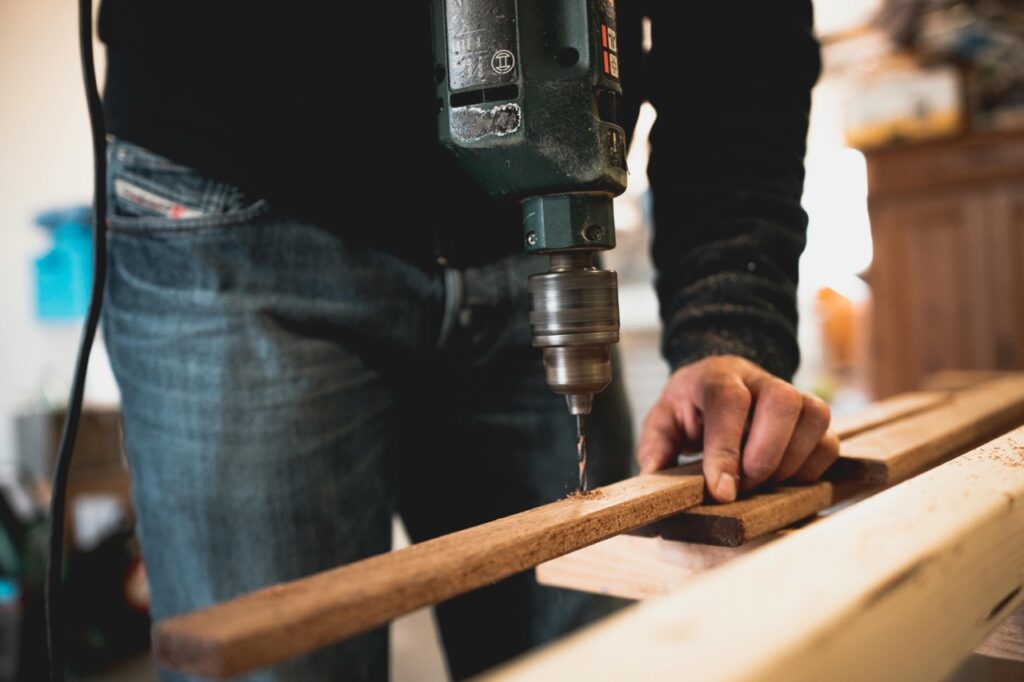Becoming a handyman involves acquiring a mix of practical skills and experience in various trades, such as plumbing, electrical work, and carpentry. The handyman role is great for people who enjoy fixing things, using problem-solving skills, and running their own business.
In this article, we’ll explore what a handyman does, the qualifications you might need, and offer some tips on how to get started in the profession. Whether you’re looking to switch careers or start a new hobby, we’ve got you covered.
Handyman Job Description
A handyman is a skilled tradesperson responsible for a variety of repair and maintenance tasks around homes and businesses. Typical duties include:
- Repairing plumbing systems, including taps and toilets.
- Fixing electrical faults, such as broken light switches.
- Assembling furniture and installing fixtures.
- Performing basic carpentry and painting jobs.
- Conducting routine maintenance checks.
Handymen need to be practical, detail-oriented, and capable of working independently. They often handle multiple tasks, ensuring properties are kept in good condition. This role requires versatility and a hands-on approach to problem-solving.
What is a Handyman?
A handyman is a versatile tradesperson skilled in various maintenance and repair tasks, often called upon to address minor issues around homes and businesses. They handle a wide range of jobs, from fixing leaky taps and patching up walls to assembling furniture and installing shelves.
Unlike specialised tradesmen, handymen offer a broad skill set, making them invaluable for general upkeep and small projects. Handyman services help maintain the functionality and appearance of properties, ensuring everything runs smoothly. With practical know-how and problem-solving abilities, a handyman is the go-to professional for those everyday repairs and improvements.
How Much Does a Handyman Earn?

The earnings of a handyman can vary depending on factors such as experience, location, and employment type.
On average, a self-employed handyman in the UK can earn around £25,000 to £30,000 per year, with more experienced professionals potentially earning up to £40,000.
Handymen working in London typically command higher rates, reflecting the higher cost of living, with salaries often ranging from £30,000 to £45,000 annually.
Apprentices or those new to the trade might start with lower earnings, around £18,000 to £20,000, but this can increase as they gain experience and skills.
What Qualifications Do You Need to Become a Handyman?
While there are no formal training qualifications required to become a professional handyman, having certain skills and certifications can be beneficial and enhance your employability. Here are some useful qualifications and skills:
- Basic Education
- Vocational Training
- Certifications
- Experience
- Specialised Courses
- Soft Skills
Let’s take a look at each of those in a little more detail:
Basic Education
A good foundation in English and Maths from GCSEs can be helpful – especially when it comes to understanding your own paperwork, adding up customer invoices, working out hourly rates, and similar.
Vocational Training

Courses in carpentry, plumbing, or electrical work can provide valuable skills. These aren’t essential but might give you a chance to earn a little bit more by using these specialist skills.
Certifications
Health and safety certifications, such as a CSCS card, can be advantageous for working on construction sites.
Experience
Hands-on experience is crucial. This can be gained through apprenticeships or working as an assistant to an experienced handyman. In some cases, extensive experience working on your own home and projects will be helpful too.
Specialised Courses
Training in specific areas like tiling, plastering, or decorating can make you more versatile and can, again, help you earn more money compared to people with less specialist skills.
Soft Skills
Good communication and problem-solving skills are essential for dealing with clients and tackling various tasks. Being friendly and accommodating will also make people less likely to haggle your price down!
Having a well-rounded skill set and relevant experience can help you stand out in this competitive field, allowing you to offer a wide range of services to your clients.
What Business Skills Do You Need to Run Your Own Handyman Business?
Running your own handyman business requires a blend of practical skills and business acumen. We’ve listed the most essential skills here – so you know what’s required to become a handyman business owner:
Bookkeeping: Running Your Finances

Firstly, understanding basic bookkeeping is essential for managing finances, including invoicing clients, tracking expenses, and ensuring timely payments. Keeping track of money in and money out will help you make sure your business model is working as it should.
Marketing Skills: Helping Customers Find You
Marketing skills are also crucial; you need to know how to promote your services effectively, whether through word-of-mouth, social media, or local advertising.
Customer Service: The People Skills That Complement Your Handyman Jobs
Like many jobs, being a handyman is essentially being your own mini customer service company. Customer service is key to building a loyal client base, so being personable, reliable, and responsive can set you apart from competitors.
Time Management Skills: Making The Most of Your Time
Additionally, time management skills are vital to juggling multiple projects and meeting deadlines efficiently.
Negotiation Skills: Making The Money You Deserve
Negotiation skills can help in securing better rates for materials from other business owners and agreeing on fair prices with clients. Having good negotiation skills helps you to make sure your self-employment is worthwhile – making the amount of money you deserve for your handyman training and technical skills.
The Legal Stuff: Making Sure You and Others Are Safe
Lastly, having a basic knowledge of legal requirements, such as obtaining necessary licences and insurance, ensures handyman businesses operate smoothly and legally. Combining these business skills with your handyman skills can lead to a successful and sustainable business.

How to Become a Handyman: A Summary
Becoming a handyman involves gaining practical skills and experience in various trades, such as plumbing, electrical work, and carpentry. Handymen enjoy fixing things, using problem-solving skills, and often running their own businesses.
A handyman performs a variety of maintenance tasks, from fixing plumbing and electrical issues to assembling furniture and conducting routine checks. They need to be practical, detail-oriented, and independent.
Earnings for handymen vary by experience and location. In the UK, self-employed handymen can earn between £25,000 to £40,000 annually, with those in London earning more. Apprentices start around £18,000 to £20,000.
While no formal qualifications are required, useful skills include basic education, vocational training, certifications, hands-on experience, specialised courses, and soft skills like communication and problem-solving.
Running a handyman business demands business acumen, including bookkeeping, marketing, customer service, time management, negotiation, and understanding legal requirements. Combining these with handyman skills can lead to you running a successful and sustainable business.


10 comments
NinaTheNewbie
I’m curious about what specialised courses you’d recommend for someone just starting out? There’s a lot out there and it’s kinda overwhelming to figure out where to begin.
CritiqueMaster
While the article covers a broad spectrum, it barely scratches the surface on certifications. In my experience, getting certified can not only bolster your credentials but significantly impact your earning potential. Perhaps a deeper dive into the types of certifications and their benefits could enhance the usefulness of this already informative piece, Guild Admin.
MarthaQuirke
Really appreciate the segment on soft skills. It’s often overlooked in many professions but utterly essential. Great communication can truly make or break your handyman business. This article does a great commendable job at knitting together the technical and interpersonal skills needed!
SarahJ
Soft skills are indeed invaluable, happy to see someone mention it! Adds a lot of value to the practical advice.
GrandpaJoe
Couldn’t agree more, MarthaQuirke. Seeing young folks learn the ropes warms my heart. It’s all about those soft skills.
Dave_digs_diy
The section on qualifications is super useful. Noticed a lot of folks dive straight into the work without considering the creds that could back them up. Makes a big difference in how you’re perceived, for sure.
FixItPhil
How much does a handyman earn? More like, how many lightbulbs does a handyman need to change to pay the bills, right? 😀
TinkerMan99
Fantastic outline on the journey to becoming a handyman. The emphasis on both technical and business skills really highlights the multifaceted nature of the job. Having ventured into some DIY projects myself, I’ve found that understanding the basics of bookkeeping and marketing makes a huge difference. It’s not just about being good with tools. Appreciate the comprehensive view, Guild Admin.
HandyHarriet
Absolutely spot on, TinkerMan99. A lot of folks dive in thinking it’s all about the tools but overlook the biz side of things. It’s a game changer once you nail that part too.
SallyBee
Just wondering if ya gotta have formal qualifications to start offering handyman services or can you just jump in if you’re good at fixing stuff around the house? Not sure how it works really.
Comments are closed.